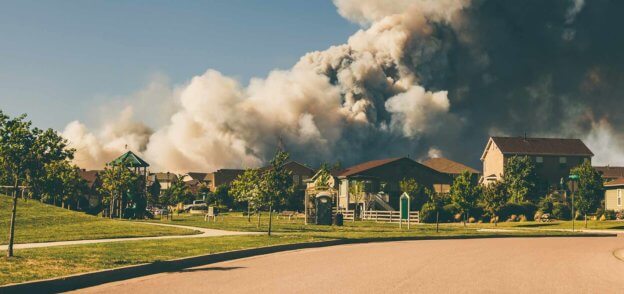Whether it’s a natural occurrence like a wildfire or earthquake or an avoidable catastrophe like flooding from a burst pipe, when major damage affects your home or property it can be tough to determine where to turn for help and advice or how to determine the responsibility of the owner vs. association.
In this article, we’ll look at what to do in the event of a disaster and how to mitigate the potentially profound consequences.
In a natural disaster, call first responders first
If you find yourself in the middle of a natural disaster or event that compromises human safety, your first call should always be to emergency services. Follow their direction closely, including obeying evacuation orders. Your property management company is never a substitute for the fire department, paramedics or police force. Do not contact your property manager to request that they call 911. Contacting emergency services directly will save time — and can potentially save lives.
Determining responsibility
Your association’s governing documents clearly articulate the exact financial responsibility of the association versus that of homeowners. Documents vary by association, but a general rule of thumb is that associations are usually responsible for repairing damage to common areas, including clubhouses, pools, sports complexes and shared outdoor spaces like parks and sidewalks. Meanwhile, homeowners are generally responsible for anything that happens on their property. In condominium complexes, the lines may be a bit more blurred. The association may take responsibility for specific elements of the condo, including plumbing or electrical, and have insurance obligations for common area elements.
The only way to understand exactly what your association covers is to read your governing documents carefully. Your property manager can help you find the language that answers your questions.
Be proactive about disaster management
While your HOA board of directors can’t do much while a disaster is occurring, they can take steps to increase awareness and preparedness. Some ideas include: creating and posting clear evacuation maps throughout the community, encouraging residents to assemble earthquake kits, and developing a community-wide plan to protect pets in case of emergency. Proactivity and awareness can be incredibly useful during emergency situations. Your property manager can help your board schedule trainings and info sessions for the community.
Dealing with financial disasters
After an emergency comes the financial fallout. This aspect of recovery will likely require you to deal with multiple regulatory bodies, including city, state, county and homeowners association.
Once again, exactly who is responsible for what will be outlined in your community’s governing documents. Usually, you (or, more accurately, your homeowners insurance) assumes responsibility over anything that only serves your home. If the damaged item in question serves multiple homes, it’s likely the responsibility of your HOA.
Navigating the maze
Repairs to damage from a disaster don’t happen overnight, which is why it is crucial that you remain patient. If there is major damage that affects multiple homes or elements of your community, what often happens is that the homeowner or the HOA will tender a claim to their insurance company to fund community repairs.
The smartest thing you can do in these instances is to stay involved. Be proactive about providing paperwork, obtaining estimates and returning communications promptly. Utilize your property manager as a resource. They are available to help you as much as they are involved in assisting the association.
However, remember that resolving the effects of a disaster must proceed within a clearly-defined parliamentary process. While it might feel like things are proceeding at a snail’s pace, this structure ensures that all residents of your community receive equal treatment. Trust the process and remain in communication with your property management company. They want to resolve the issue as quickly as you do.
Finding yourself in the middle of a natural or man-made disaster is never fun. It can be a frightening, stressful time for everyone involved. Always keep your homeowner’s insurance policy up to date. Once the dust has settled, your property manager can help you—and your neighbors, if they are affected too—start picking up the pieces.
Have questions about your responsibilities in case of disaster? Your Keystone manager can help you find accurate answers.
